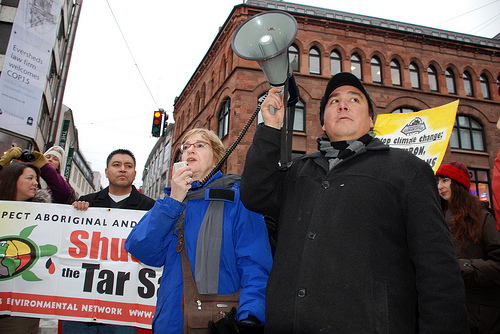While the New York Times editorial board says, “The Paris [climate summit] may well be the world’s last, best chance to get a grip on a problem that, absent urgent action over the next decade, could spin out of control,” most are already bracing for another massive failure by the political elite at what is being disparagingly described as the “Conference of Polluters.”
This is a reality because the pledges being made by countries in advance of the COP21 in Paris are simply insufficient. Open Democracy has reported, “Cambridge University number cruncher Chris Hope concluded that if the European Union countries cut emissions by 40 percent by 2030 (as they have pledged), if the rest of the developed countries follow the U.S. commitment, and if the developing countries follow China’s promise, the most likely result will be a [disastrous] global temperature rise of 3.6 degrees Celsius in 2100.” As for Canada, the Harper government pledged an extremely weak 30 per cent reduction below 2005 levels by 2030 (which equals 14 per cent below 1990 levels by 2030).
In addition to this, Patrick Bond laments, “There are no reliable state allies of climate justice at present and indeed there really are no high-profile progressives working within the COPs. It’s a huge problem for UN reformers because it leaves them without a policy jam-maker inside to accompany activist tree-shaking outside. The UN head of the COP process is an oft-compromised carbon trader, Christiana Figueres. Although once there were heroic delegates badgering the COP process, they are all gone now… If you are serious about climate justice, the message from these COP experiences is unmistakeable: going inside is suicide.”
But Bond writes there is hope in grassroots mobilization. He says, “A great deal of coalition building has occurred in France and indeed across Europe [since last August]. The proximate goal is to use awareness of the Paris COP21 to generate events around the world in national capitals on November 28 and 29 — just before the summit begins — and on December 12, as it climaxes. …Projects [are being planned] like November 27-29 mass actions aimed at municipalities; a Brussels-Paris activist train; …the Alternatiba alternatives project with 200 participating villages from the Basque country up to Brussels, which will culminate on September 26-27…”
In a similar track, Campaign Against Climate Change has proposed, “We want everyone to know that the students in Paris will be occupying their universities on Monday 7 December, and on Tuesday they will be dancing out of the colleges onto the streets and asking everyone to join them. …We want to begin now campaigning for university and college occupations in our own countries. We will be doing that in the U.K. We invite you to join us in your country.”
Rising Tide North America is calling for a series of mass actions across the United States and Canada. They note, “From September to the end of November, Flood the System envisions an escalating series of direct actions and demonstrations targeting the economic and political systems at the root of the crisis, inspired by recent movements led by low-wage workers, immigrants, and communities responding to police brutality.”
And ETC executive director Pat Mooney says, “[Paris] should start like [the big march this past September in] New York and end like Seattle. Shut the thing down.”
The Council of Canadians is currently in the process of determining what our intervention will be at the time of the UN climate talks this November 30 to December 11.
We have been campaigning to stop the Energy East and Trans Mountain pipelines as well as other carbon intensive projects — like fracking and the Site C dam — because of their climate change impacts and calling for sustainable energy solutions, just transition strategies and good green jobs. Maude Barlow has also been highlighting, “If water is mentioned at all [in climate talks], it is as one more victim of climate change, almost always solely attributed to the burning of fossil fuels. The fact that destroying water-retentive landscapes is in and of itself a major cause of climate change is not part of the analysis or discussion in climate change circles.”
We took part in the protests and counter-summits at the time of the UN climate talks in Copenhagen in 2009, Cancun in 2010 and Lima in 2014. We recognize both the importance and the very real limits of those strategies for Paris in 2015.
In the most recent issue of Adbusters, Gwynne Dyer writes that the “climate wars” of the future will be driven by three factors: the closing of borders to the waves of climate refugees who lack water and whose land has dried up and blown away; the proliferation of failed states who can no longer feed their people; and the increased number of dams between countries that share a river system. Mike Hodder writes in that same issue of Adbusters that, “A commitment was made to resolve the issues that collapsed in Lima once and for all this December in Paris, but world leaders have repeatedly let us down. If an agreement can’t be made at the upcoming UN Climate Conference we are staring into the face of a global environmental genocide from which there is no turning back. Our only shot at curbing climate change — our only shot at survival, may be revolution.”
The stakes are evidently planetary survival and the world will be watching Paris this year.
Photo: Barlow speaks at a protest outside the Canadian embassy in Copenhagen during the UN climate talks in 2009.



